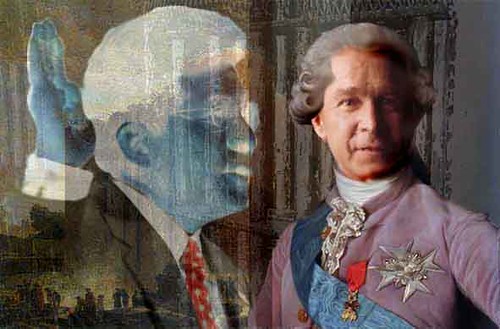Seems Like Old Times
"In French history, lettres de cachet were letters signed by the king of France, countersigned by one of his ministers, and closed with the royal seal, or cachet. They contained orders directly from the king, often to enforce arbitrary actions and judgements that could not be appealed.
“In the case of organized bodies lettres de cachet were issued for the purpose of preventing assembly or to accomplish some other definite act. The provincial estates were convoked in this manner, and it was by a lettre de cachet (in this case, a lettre de jussipri) in which the king ordered a parliament to register a law in the teeth of its own refusal to pass it.
The best-known lettres de cachet, however, were penal, by which a subject was sentenced without trial and without an opportunity of defense to imprisonment in a state prison or an ordinary jail, confinement in a convent or a hospital, transportation to the colonies, or expulsion to another part of the realm. The wealthy sometimes bought such lettres to dispose of unwanted individuals.*”
“The Algerian experience confirms how a type-A secret police force is born. Torture in Algeria followed logically from the dictates of the Special Powers Law of March 16, 1956, which permitted the Prefect of Algiers to delegate to the military exceptional authority beyond ordinary police powers. As the historian John Talbott has put it: ‘These powers, as exercised in the circumstances prevailing in Algiers in early 1957, opened the door to the practice of torture. It is not hard to see how this happened. The Laws of the Fourth Republic required a suspect to be brought before an examining magistrate . . . within twenty-four hours of his arrest. Such a procedure was one of the safeguards against frivolous arrest and illegal detentions. But in Algiers, the paratroopers arrested and detained for questioning hundreds of men and women suspected of nothing more than possessing useful information. The key provision of the Special Powers Act, and in some respects, the key to much of the controversy over the Battle of Algiers, was the authority to intern suspects, the right of assignation a’ re’sidence.”**
Indefinite Detention scares me. It strikes at the core of human dignity and liberty. The principle of equality under the law rests partially on the idea that the right to freedom is based on the right to privacy. Each person has the right to his or her own private destiny, his or her own private ideas, and freedom of action. And what makes it worse is that the idea that the police state doesn’t need to “show cause” in order to detain someone, allows that state to take people at will, and to incarcerate them secretly. What if, in four years this country turns into a police state? With a sufficient amount of paranoia a people could knock out the very few safeguards that prevent a police state, and keep the national police from turning into a secret police. Secret police are not called “secret” because no one knows that they exist, but because their actions are entirely beyond the purview of any official, or legal body of the government. Secret police are – officially – unofficial. When an arrest or what I would term “abduction” takes place, no paper trail, no witnesses, no known whereabouts of the “abductee” are given, because secret police are not responsible to any court, or any review but their own. Secret police tend to become “states within the state”, shrouded in – secrecy. It is a country no one willingly visits, or travels into, but is rather “abducted” into. One just simply disappears into the mist, “the night and fog” and is never seen again.
You can’t have a secret police without a witch hunt every now and then, and you can’t have that without a dire outside, or internal threat. In a democracy, that threat would unify, but in a police state, it breeds paranoia.
According to the Bush and Blair governments in the U.S. and Britain respectively, terrorism is just that kind of threat.
It helps of course if that threat initially is thought to come from some group on the fringes of society. At one time it was Jews, Gypsies, (The Soviet Union had it in for Baptists.) and other groups outside of the norm. Now it is people with a foreign passport. But soon some other disaffected group may come under suspicion. Soon we could add minorities to the group. The poorer you are the more vulnerable you will be. And then for good effect let’s add other fringe groups that simply – don’t follow the main lifestyle. Persecute Goths for instance, or speed metal freaks, who’ll miss’em?
Well if you don’t raise a finger to stop it, and they get to arresting your son, or daughter, you’ll miss them. I seem to remember the words of Martin Niemöller, when they asked him how a democratic society like that of Weimar Germany could be allow itself to turn into the Third Reich:
"In Germany, they first came for the communists, and I didn't speak up because I wasn't a communist. Then they came for the Jews, and I didn't speak up because I wasn't a Jew. Then they came for the trade unionists, and I didn't speak up because I wasn't a trade unionist. Then they came for the Catholics and I didn't speak up because I wasn't a Catholic. Then they came for me -- and by that time there was nobody left to speak up."
*From Wikipedia
**“Secret Police” by Thomas Plate and Andrea Darvi Doubleday & Company, Inc. Garden City, New York 1981




No comments:
Post a Comment